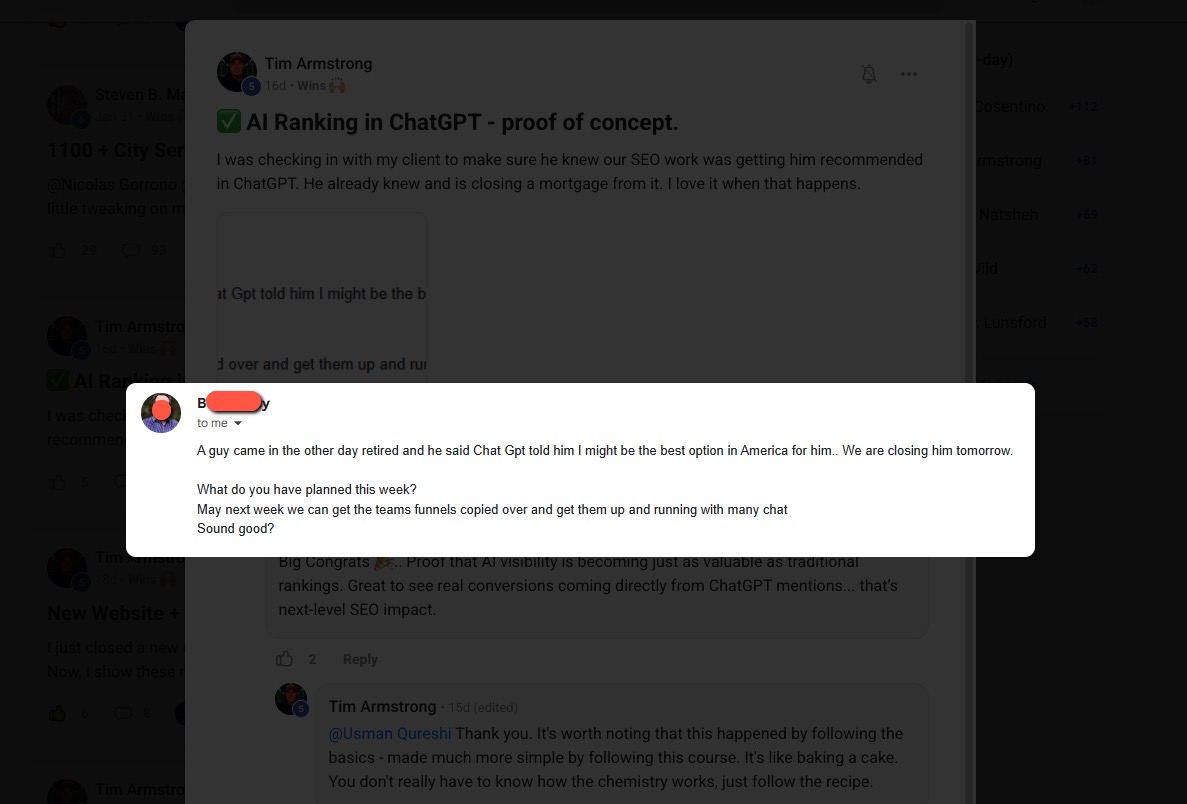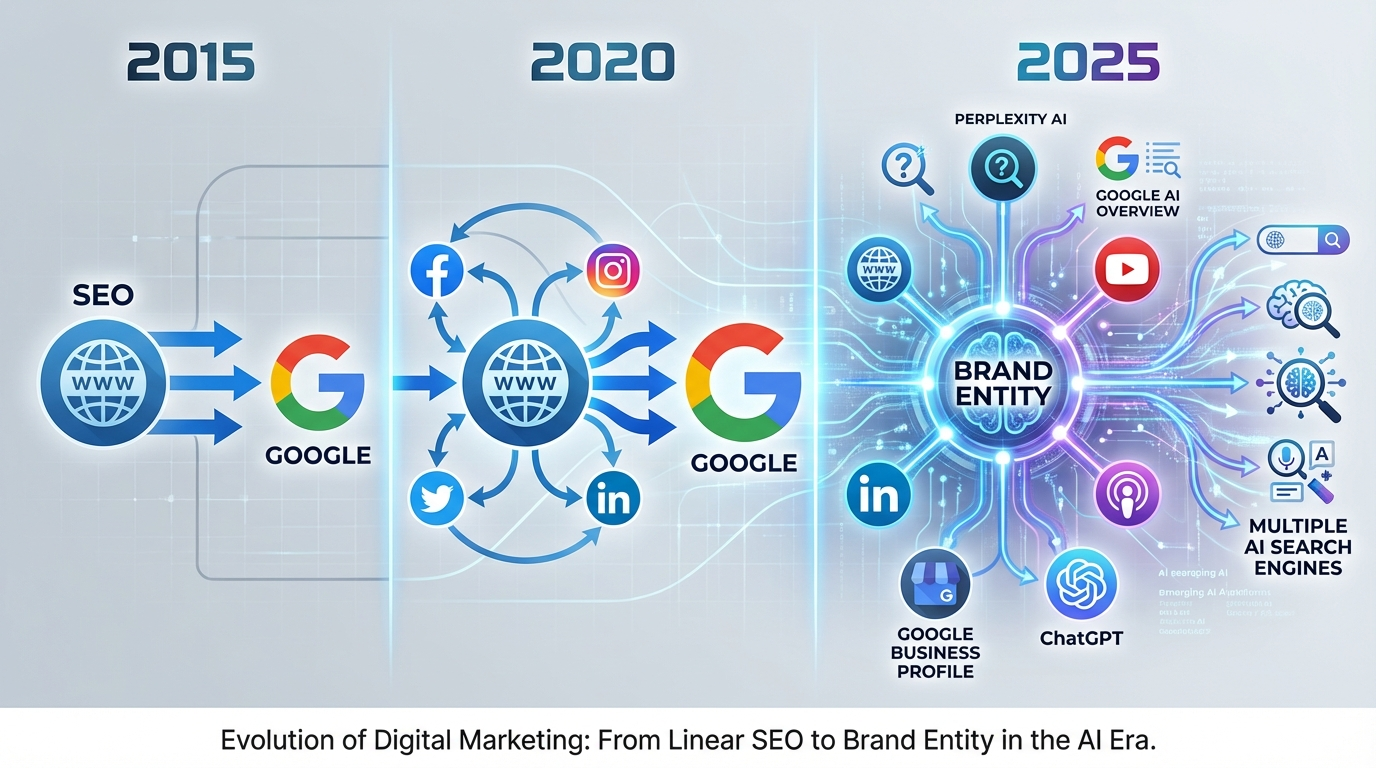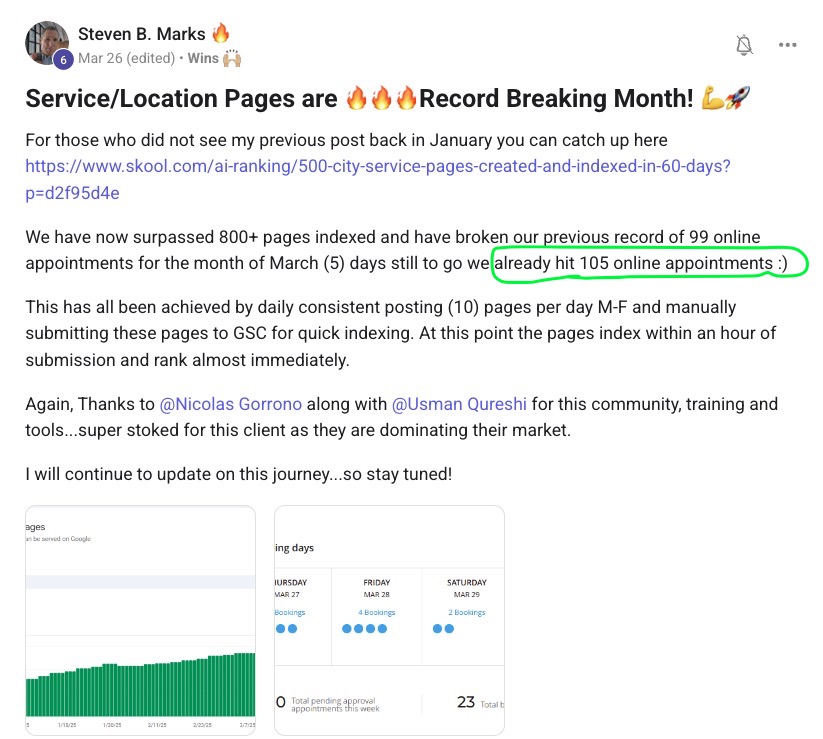
AI For SEO: A Complete Beginner's Guide
The fusion of artificial intelligence and search engine optimization has changed how businesses approach online visibility. If you've been wondering "Can I use AI for SEO?" or "Can ChatGPT help with SEO?", the answer is a resounding yes. AI tools have transformed SEO from a time-consuming manual process into a streamlined, data-driven strategy that delivers faster results with less effort.
This guide will walk you through everything you need to know about leveraging AI for SEO success in 2025, whether you're a small business owner handling your own digital marketing or simply looking to understand how these powerful technologies can work together to boost your online presence.
Understanding AI SEO Fundamentals
AI SEO refers to the application of artificial intelligence technologies to enhance and streamline search engine optimization efforts. Unlike traditional SEO, which often relies heavily on manual processes and educated guesswork, AI SEO harnesses the power of machine learning algorithms and natural language processing to analyze vast amounts of data, identify patterns, and make data-driven recommendations.
The integration of AI into SEO practices isn't just a trendy buzzword—it represents a fundamental shift in how we approach digital visibility. AI tools can quickly process and analyze information at a scale that would be impossible for humans, leading to more accurate insights and more effective strategies.
How AI is Changing Traditional SEO
Traditional SEO often involves time-consuming tasks like manual keyword research, competitor analysis, and content optimization. These processes, while effective, can take days or even weeks to complete properly. AI transforms this landscape by:
- Analyzing thousands of keywords and their metrics in minutes rather than days
- Identifying content gaps and opportunities that human analysis might miss
- Providing real-time recommendations based on current search trends
- Automating repetitive tasks like meta tag generation and internal linking
- Predicting which content will perform best before you even create it
- Help you create scalable content whilst maintaining quality integraty
The result? You can achieve better SEO outcomes in less time, allowing you to focus on strategy rather than getting bogged down in execution.
Benefits of Using AI for SEO
For small business owners and SEO beginners, the advantages of incorporating AI into your strategy are substantial:
- Time Efficiency: Reduce hours spent on research and optimization
- Data-Driven Decisions: Base your strategy on comprehensive analysis rather than assumptions
- Competitive Edge: Identify opportunities your competitors are missing
- Scalability: Manage more keywords and content with the same resources
- Adaptability: Quickly pivot your strategy based on real-time data
Real‑World Example: Daniel, one of our community members—a seasoned fitness coach and calisthenics expert—leveraged AI to publish roughly 160 detailed exercise how‑to pages in just two months. Because his content genuinely solved reader problems, his organic clicks and overall traffic doubled in the same timeframe. Daniel’s success shows how combining human expertise with AI’s muscle work can lead to dramatic, positive results.

Common Misconceptions About AI and SEO
Despite its benefits, there are several misconceptions about AI in SEO that need addressing:
Misconception 1: "AI will completely replace human SEO experts."
Reality: AI is a powerful tool, but it works best when guided by human expertise and creativity. The most effective approach combines AI efficiency with human strategic thinking.
Misconception 2: "AI-generated content will be penalized by Google."
Reality: Google's stance is on low-quality content, not how it was created. Well-edited, valuable AI-generated content that serves user intent can perform excellently in search results.
Misconception 3: "AI SEO tools are too expensive for small businesses."
Reality: While some enterprise-level tools are costly, there are many affordable and even free AI tools that can significantly improve your SEO efforts, specially if you learn how to use an API key.
Misconception 4: "AI SEO is too complicated for beginners."
Reality: Many AI tools are designed with user-friendly interfaces specifically for non-technical users, making advanced SEO techniques accessible to beginners.
Essential AI Tools for SEO Success
The right tools can make all the difference in your AI SEO journey. Here's a breakdown of the essential AI tools that will help you unlock your SEO potential in 2025.
ChatGPT: Your AI SEO Assistant
ChatGPT has become an indispensable tool for SEO professionals and beginners alike. This versatile AI can help with:
- Content Creation: Generate article outlines, blog posts, meta descriptions, and more
- Keyword Expansion: Brainstorm related keywords and topics
- Competitor Analysis: Analyze competitor content and identify gaps
- Technical SEO: Generate schema markup and troubleshoot issues
- Content Optimization: Suggest improvements for existing content
The key to success with ChatGPT lies in effective prompting. Rather than asking vague questions, provide specific instructions and context. For example, instead of asking "Give me SEO keywords," try "Generate 20 long-tail keywords related to AI SEO tools for small business owners, focusing on informational intent.". If you are looking to understand this a bit more check out our give on how to prompt different ai reasoning models.
Perplexity: Deep Research Capabilities
Perplexity takes AI research to the next level, allowing you to conduct comprehensive research on any SEO topic. Unlike traditional search engines, Perplexity provides detailed, sourced answers to complex questions. Use it for:
- Trend Analysis: Identify emerging SEO trends and strategies
- Competitive Intelligence: Research competitor strategies and market positioning
- Content Research: Gather in-depth information on specific topics
- Industry Updates: Stay current on algorithm changes and best practices
The depth of information Perplexity provides makes it invaluable for creating comprehensive, authoritative content that ranks well in search results.
DataForSEO: Comprehensive SEO Data
DataForSEO is a fantastic, budget‑friendly alternative to premium suites like Ahrefs and SEMrush—especially when you pair it with its Google Sheets extension. It provides high‑quality keyword research data, backlink metrics, and just about any SEO insight you could need for a fraction of the price, with only a slight compromise in user experience.
DataForSEO provides powerful API access to SEO data, allowing you to:
- Track Rankings: Monitor your positions for target keywords
- Analyze Competitors: Identify competitor strengths and weaknesses
- Research Keywords: Find valuable keyword opportunities
- Audit Websites: Identify technical SEO issues
- Monitor Backlinks: Track your link profile and find new opportunities
MAKE: Automation for SEO
Make (formerly Integromat) allows you to create powerful automations that connect your various SEO tools and streamline workflows:
- Automated Reporting: Generate and send SEO reports automatically
- Content Distribution: Publish and promote content across multiple platforms
- Data Collection: Gather SEO data from various sources into centralized dashboards
- Competitor Monitoring: Get alerts when competitors publish new content
- Backlink Outreach: Automate parts of your link building process
- Keyword Research: Automate all of your keyword research work with ONE automation
AI-Powered Keyword Research
Keyword research forms the foundation of any successful SEO strategy, and AI has transformed this process from art to science. With AI-powered tools, you can now identify exactly which keywords will drive the most relevant traffic to your site with unprecedented precision.
Traditional vs. AI-Enhanced Keyword Research
Traditional keyword research often involves:
- Manual brainstorming of seed keywords
- Checking search volumes and competition metrics
- Guessing at user intent
- Time-consuming spreadsheet analysis
AI-enhanced keyword research elevates this process by:
- Automatically generating relevant keyword ideas
- Analyzing search intent patterns across thousands of queries
- Identifying semantic relationships between keywords
- Predicting keyword difficulty specific to your website
- Forecasting traffic potential with greater accuracy
I've created an entire video tutorial on how to do keyword research with AI in 2025. You can check out the video below for a complete walkthrough.
Using DataForSEO for Comprehensive Keyword Data
DataForSEO provides access to robust keyword data that can transform your research process:
- Start with seed keywords related to your business or content topic
- Expand your list using DataForSEO's keyword suggestions
- Analyze metrics including search volume, CPC, and competition
- Filter by intent to find keywords that match your content goals
- Prioritize opportunities based on potential traffic and conversion value
Finding Low-Competition, High-Value Keywords
The real magic of AI keyword research lies in uncovering those hidden gems—keywords with decent search volume but lower competition. Here's how to find them:
- Look for long-tail variations of popular keywords
- Analyze question-based queries related to your topic
- Identify "shoulder niches" adjacent to your main topic
- Focus on keywords with specific intent that larger competitors might ignore
- Use AI to identify trending topics before they become competitive
Reality Check: Keyword tools—whether Ahrefs, SEMrush, or even DataForSEO—are helpful, but they’re not sources of absolute truth. If a term shows “0–10” or even zero monthly searches, there’s often far more real‑world demand lurking beneath the surface. Trust your expertise: if your gut says a keyword matters to your audience, target it anyway.
Understanding Search Intent Through AI Analysis
AI excels at categorizing and understanding search intent at scale. Modern AI tools can analyze thousands of search queries and classify them into intent categories:
- Informational: Users seeking information or answers
- Navigational: Users looking for a specific website
- Commercial: Users researching products before purchasing
- Transactional: Users ready to make a purchase
By matching your content to the correct search intent, you dramatically increase your chances of ranking well and converting visitors.
Creating SEO-Optimized Content with AI
Content creation is perhaps where AI has made the most visible impact on SEO. With the right approach, AI can help you create content that not only ranks well but also genuinely serves your audience's needs.
AI Content Creation Best Practices
To create effective AI-generated content that ranks well:
- Start with thorough research using tools like Perplexity
- Create detailed outlines before generating full content
- Use specific, detailed prompts that include your target keywords
- Always edit AI-generated content for accuracy and brand voice
- Enhance with unique insights and personal experiences
- Optimize structure with clear headings, short paragraphs, and bullet points
- Add value beyond what competitors offer through depth or unique angles
Remember that AI is a starting point, not the final product. The most successful content combines AI efficiency with human creativity and expertise.
Using Perplexity for Deep Research
Perplexity excels at providing comprehensive, sourced information on any topic. Here's how to leverage it for content creation:
- Start broad with general topic queries
- Drill down into specific aspects of your topic
- Ask for contrasting viewpoints to ensure balanced coverage
- Request data and statistics to support key points
- Look for recent developments to keep content current
- Verify sources that Perplexity references
ChatGPT Prompts for SEO-Friendly Content
The quality of your prompts directly impacts the quality of AI-generated content. Here are effective prompts for SEO content creation:
For Article Outlines:
Create a detailed outline for a 2000-word article about [TOPIC] targeting the keyword [KEYWORD]. Include H2 and H3 headings, key points to cover under each section, and suggest data points or examples to include. The article should address [USER INTENT] and cover the topic more comprehensively than competitors.
For Content Generation:
Write a [SECTION TYPE] section for an article about [TOPIC]. The target keyword is [KEYWORD], which should be used naturally. The tone should be conversational but authoritative. Include specific examples, data if relevant, and actionable advice. The section should be approximately [WORD COUNT] words.
For Content Optimization:
Review this content for SEO optimization opportunities: [PASTE CONTENT]. Suggest improvements to better target the keyword [KEYWORD], enhance readability, improve structure, and address user intent more effectively. Do not change the overall meaning or voice.
The Importance of Human Editing and Oversight
While AI can generate impressive content, human editing remains essential for:
- Fact-checking: Ensuring all information is accurate and current
- Brand voice alignment: Adjusting tone to match your brand personality
- Adding unique insights: Incorporating your expertise and experiences
- Ethical considerations: Ensuring content is responsible and inclusive
- Strategic emphasis: Highlighting points most relevant to your business goals
On-Page Optimization with AI
On-page optimization is where technical expertise meets content quality, and AI tools excel at bridging this gap for beginners. With AI assistance, you can implement advanced on-page SEO techniques without needing deep technical knowledge.
Technical SEO Improvements with AI Tools
AI can help identify and fix technical SEO issues that might be holding your site back:
- Site structure optimization for better crawlability
- Page speed improvement recommendations
- Mobile-friendliness enhancements
- Structured data markup generation
- Duplicate content identification
- Broken link detection and fixing
Optimizing Metadata, Headers, and Image Alt Text
AI tools can generate and optimize critical on-page elements:
Title Tags: AI can analyze top-ranking pages and suggest title tag formats that balance keyword usage with click-worthiness.
Meta Descriptions: Generate compelling meta descriptions that include target keywords while encouraging clicks.
Header Structure: Analyze and optimize your H1-H6 structure to create a logical content hierarchy that search engines can easily understand.
Image Alt Text: Automatically generate descriptive, keyword-rich alt text for images that improves accessibility while supporting SEO goals.
AI-Driven Internal Linking Strategies
Internal linking is crucial for site structure and page authority distribution, and AI can transform your approach:
- Identify linking opportunities based on semantic relationships between content
- Suggest optimal anchor text that balances keywords with natural language
- Analyze link equity distribution across your site
- Identify orphaned content that needs more internal links
- Create topic clusters that establish topical authority
Building Quality Backlinks with AI
Backlinks remain a crucial ranking factor, and AI tools can revolutionize your approach to acquiring these valuable votes of confidence for your website.
AI Tools for Backlink Opportunity Identification
AI can help you find relevant backlink opportunities through:
- Competitor backlink analysis to identify sites linking to similar content
- Content gap analysis to find topics where you can create superior resources
- Unlinked mention monitoring to discover sites already talking about you
- Relevant directory identification for your specific niche
- Resource page discovery where your content would be a valuable addition
Analyzing Competitor Backlink Profiles
One of the most effective backlink strategies is analyzing what's working for your competitors:
- Identify your top-ranking competitors for target keywords
- Use AI tools to analyze their backlink profiles
- Look for patterns in the types of sites linking to them
- Identify gaps where you could secure similar links
- Prioritize opportunities based on authority and relevance
Strategies for Free, High-Quality Backlink Acquisition
With AI assistance, these strategies become more effective and easier to implement:
HARO (Help A Reporter Out) Monitoring
AI can help you filter HARO requests to find relevant opportunities and even draft expert responses that are likely to be quoted and linked.
Strategic Guest Posting
AI can identify relevant blogs, analyze their content preferences, and help craft pitches that are likely to be accepted.
Creating Link-Worthy Resources
AI can analyze highly-linked content in your niche and help you create superior resources that naturally attract links.
Broken Link Building
AI tools can find broken links on relevant websites and help you create replacement content that site owners will want to link to.
Community Participation
AI can help you identify relevant online communities and suggest valuable contributions that can lead to backlink opportunities.
Answer Questions on Featured.com (My personal faiourite)
AI can help you formulate incredible answers for Featured.com, which is a publication platform that supports publishers and subject matter experts. I use this all the time and have had amazing results from it.
If you are looking to start generating high-quality backlinks for free, I recommend saving the video below and taking some time to go through it.
Measuring Success and Continuous Improvement
The true power of AI in SEO comes from its ability to not just implement strategies but to continuously measure, learn, and improve based on real-world results.
Setting Up AI-Powered SEO Tracking
Effective tracking is essential for SEO success, and AI can enhance your measurement capabilities:
- Implement comprehensive tracking across rankings, traffic, and conversions
- Set up automated alerts for significant changes
- Create custom dashboards that focus on your key metrics
- Establish regular reporting cycles to monitor progress
- **Track competitors alongside your own performance
Key Metrics to Monitor
While there are countless metrics you could track, focus on these essential indicators:
- Organic traffic growth overall and by page/section
- Keyword rankings for primary and secondary terms
- Conversion rates from organic traffic
- Page engagement metrics like time on page and bounce rate
- Backlink quality and quantity growth
- Core Web Vitals and technical performance
- Click-through rates from search results
Using AI to Interpret SEO Data
The real value of AI in measurement comes from interpretation, not just data collection:
- Pattern recognition across thousands of data points
- Anomaly detection to identify unexpected changes
- Predictive analytics to forecast future performance
- Causal analysis to determine which actions led to which results
- Opportunity identification based on current performance
Creating a Sustainable AI SEO Workflow
To maintain long-term SEO success with AI, establish a sustainable workflow:
- Research and plan using AI-powered tools
- Implement strategies with AI assistance
- Measure results through automated tracking
- Analyze performance with AI interpretation
- Refine approach based on insights
- Repeat the cycle with continuous improvement
Conclusion: The Future of AI and SEO
AI has fundamentally transformed SEO from a manual, time-intensive process into a data-driven, efficient strategy accessible to businesses of all sizes. The question is no longer "Can AI do SEO for my website?" but rather "How can I best leverage AI to maximize my SEO results?"
Key Takeaways
- AI tools make advanced SEO techniques accessible to beginners and small business owners
- The combination of human creativity and AI efficiency produces the best results
- Data-driven decisions lead to more predictable and sustainable SEO success
- Automation of repetitive tasks frees up time for strategic thinking
- Continuous measurement and improvement is essential for long-term success
Future Trends in AI SEO
Looking ahead, we can expect AI's role in SEO to continue evolving:
- More sophisticated content generation that's increasingly indistinguishable from human-written content
- Predictive SEO that anticipates algorithm changes and market trends
- Hyper-personalization of search results based on user behavior and preferences
- Voice and visual search optimization becoming mainstream SEO considerations
- AI-driven user experience optimization that directly impacts rankings
Next Steps for Your AI SEO Journey
To put this guide into action:
- Start with one AI tool that addresses your most pressing SEO need
- Establish baseline measurements before implementing new strategies
- Implement changes incrementally to track what works
- Join our community for ongoing support and advanced strategies
- Continuously learn and adapt as tools and best practices evolve
Join Our Community
The journey to SEO success is more enjoyable and effective when you're not going it alone. Join our vibrant community at skool.com/ai-ranking to connect with fellow business owners, share insights, and get personalized support as you implement AI-powered SEO strategies.
Our community offers:
- Expert guidance from seasoned SEO professionals
- Peer support from businesses at various stages of their SEO journey
- Exclusive resources including templates, checklists, and tutorials
- Regular Q&A sessions to address your specific challenges
- Early access to new strategies and tools
- Results like this...

By combining the power of AI with human collaboration and support, you'll be well-equipped to achieve sustainable SEO success in 2025 and beyond.



.webp)



